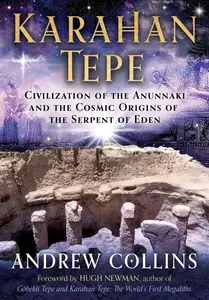Karahan Tepe Civilization of the Anunnaki and the Cosmic Origins of the Serpent of Eden

Free Download Karahan Tepe: Civilization of the Anunnaki and the Cosmic Origins of the Serpent of Eden by Andrew Collins, Hugh Newman
English | October 8, 2024 | ISBN: 1591434785 | 440 pages | MOBI | 57 Mb
An in-depth investigation of the ancient structures at Karahan Tepe, its builders, and its cosmic shamanic purpose
* Examines the intricate carvings, chambers, and structures, revealing the site’s acoustical properties, shamanic symbolism, and astronomical alignments
* Reveals how Karahan Tepe was used by shamans to connect with the Milky Way’s Galactic bulge in its role as the head of the cosmic serpent
* Explains how the site’s builders, who created the world’s first post-Ice Age civilization, are remembered in myth and legend as the Watchers and Nephilim of Jewish religious tradition and as the Anunnaki gods of Sumerian mythology
Considered the most important archaeological discovery of the 21st century, Karahan Tepe is an enormous complex of stone structures in southeastern Turkey covering an estimated ten acres. Built more than 11,000 years ago, Karahan Tepe contains some of the oldest monumental architecture anywhere on Earth, including human and animal statues, ubiquitous snake carvings, T-shaped pillars, and interconnecting underground enclosures with stone columns carved directly from the bedrock.
Chronicling his explorations of Karahan Tepe, Andrew Collins presents the first in-depth investigation of the discoveries at the site: who built it, its astronomical alignments, and its cosmological connections. He examines the intricate carvings and architectural features, including a newly discovered statue of a giant human figure. Explaining how the site functioned as a shamanic oracle center, Collins shows how its rock-cut structures were used to connect with the Milky Way’s Galactic Bulge and stars of Scorpius in their role as the head and active spirit of a perceived cosmic serpent. He traces this serpent motif throughout history, identifying it with the biblical serpent of Eden, the kundalini of Vedic tradition, and the black snake of the Yezidis. He demonstrates how the belief in the existence of the Milky Way serpent among the inhabitants of Karahan Tepe went on to influence the foundation of the Gnostic Ophite mysteries suppressed by the Christian Church. He also shows how the founders of Karahan Tepe were recalled in Hebrew myth and legend as the Watchers and Nephilim and in Sumerian and Babylonian mythology as the Anunnaki.
Sharing a wealth of evidence, Collins confirms that Karahan Tepe and its sister site of Göbekli Tepe belonged to the world’s first post-Ice Age civilization, which today bears the enigmatic name of Taş Tepeler.